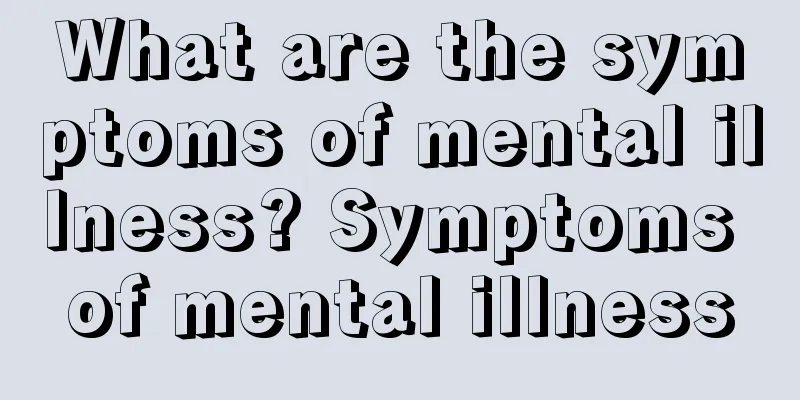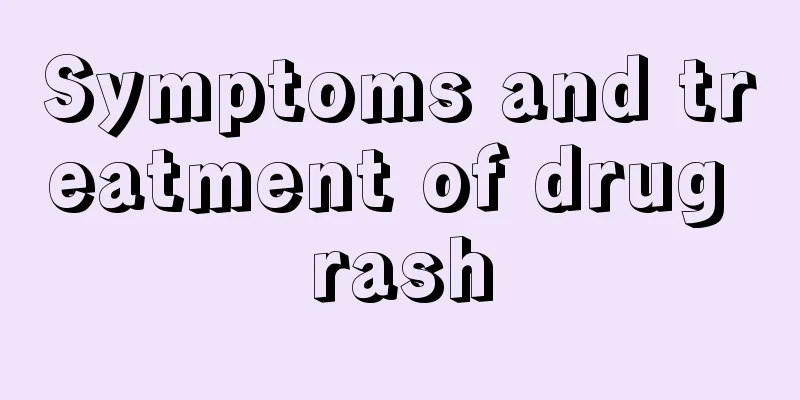What are the symptoms of mental illness? Symptoms of mental illness

|
According to surveys, the incidence of mental illness in the world has reached a very high level. Without human intervention and treatment, the disease will cause great harm and seriously affect people's lives and work. Therefore, we need to understand the specific manifestations of mental illness so that we can detect and treat it early. Anxiety disorders It shows obvious autonomic nervous system dysfunction, and physical discomfort such as dizziness, palpitations, dyspnea, dry mouth, frequent urination, urgency, sweating, etc. occurs in varying degrees. Physical tension, overreactivity of the autonomic nervous system, nameless worry about the future, and excessive alertness. Psychiatric disorders The symptoms include often feeling that others control their thoughts; feeling that others know their thoughts; feeling lonely even when with others and unable to communicate with others; often feeling that there are serious problems with their bodies; poor memory and a frequent feeling that there is something wrong with their brains, etc. phobia Performance: Arousing intense fear of an object or situation. Fear is often accompanied by obvious autonomic nervous system symptoms. Patients know that this fear is unnecessary, but they cannot control it and still try their best to avoid it. There are three common clinical types: agoraphobia, social phobia and simple phobia. Obsessive-compulsive disorder is often manifested as repeated obsessive thoughts and compulsive intentions and actions. Knowing that it is unreasonable and unnecessary, but unable to control it. Such as counting repeatedly, recalling repeatedly, repeating certain actions (such as washing hands) Somatization symptoms It refers to the patient's feelings when the body's physiological functions become abnormal in a diseased state. The manifestations of somatization symptoms are often complex and multi-site, involving any organ and function and can simulate the manifestations of any disease. The most common symptom is pain such as headache, chest pain, abdominal pain, muscle pain, etc.; common symptoms include fatigue, dizziness, shortness of breath, palpitations, abdominal distension; it can also manifest as indigestion, diarrhea, cough, difficulty walking, difficulty urinating, fainting or loss of consciousness, etc. Interpersonal sensitivity The main manifestations are: not being able to properly handle the relationship between individuals and society, feeling uncomfortable in the crowd, being wary, suspicious and jealous when getting along with others, having all kinds of confusion in interpersonal relationships, and having tense relationships with classmates and teachers. depression It is a psychological disorder caused by dysfunction of the brain's serotonin and norepinephrine neurotransmitter systems, characterized by depression, lack of interest or pleasure, persistent fatigue, and low motivation for life. It is often accompanied by psychosomatic symptoms such as nervousness, insomnia, early awakening, weight loss, and general discomfort. |
>>: How to effectively treat post-herpetic syndrome
Recommend
The effect of lemon and honey
Lemon is a very common thing in people's dail...
Will lung cancer cells starve to death? Introducing the key points of diet for lung cancer in recovery period
Lung cancer patients must strengthen their dietar...
Detailed introduction to the causes of melanoma
In recent years, with the increasing incidence of...
Can probiotics be taken regularly?
Some parents will let their babies eat some probi...
What to do if your nose is too big? Rhinoplasty is very common
Many women feel that their noses are too big. Alt...
What are the five elements for early diagnosis of cervical cancer?
In recent years, cervical cancer has become one o...
Is it good to pluck your beard frequently?
Beard is a male sexual characteristic. Many men l...
What fruit to eat when you have a broken bone
A fracture refers to a partial break or comminute...
What should patients with pituitary tumors eat?
We all have such common sense that after sufferin...
Cervical cancer screening methods
The patient lies flat on the examination table, a...
What factors in daily life are likely to cause gastric cancer
The treatment of gastric cancer must be timely to...
Why exercise can prevent breast cancer
Medical scientists have found that exercise can h...
What is the treatment for advanced liver cancer? Three methods are recommended for advanced liver cancer treatment
If the metastatic site is single, the tumor is sm...
Red spots on eyelids
Red spots on the eyelids do not necessarily mean ...
Western medicine treatment for hair loss
For people with severe hair loss or baldness, fin...









